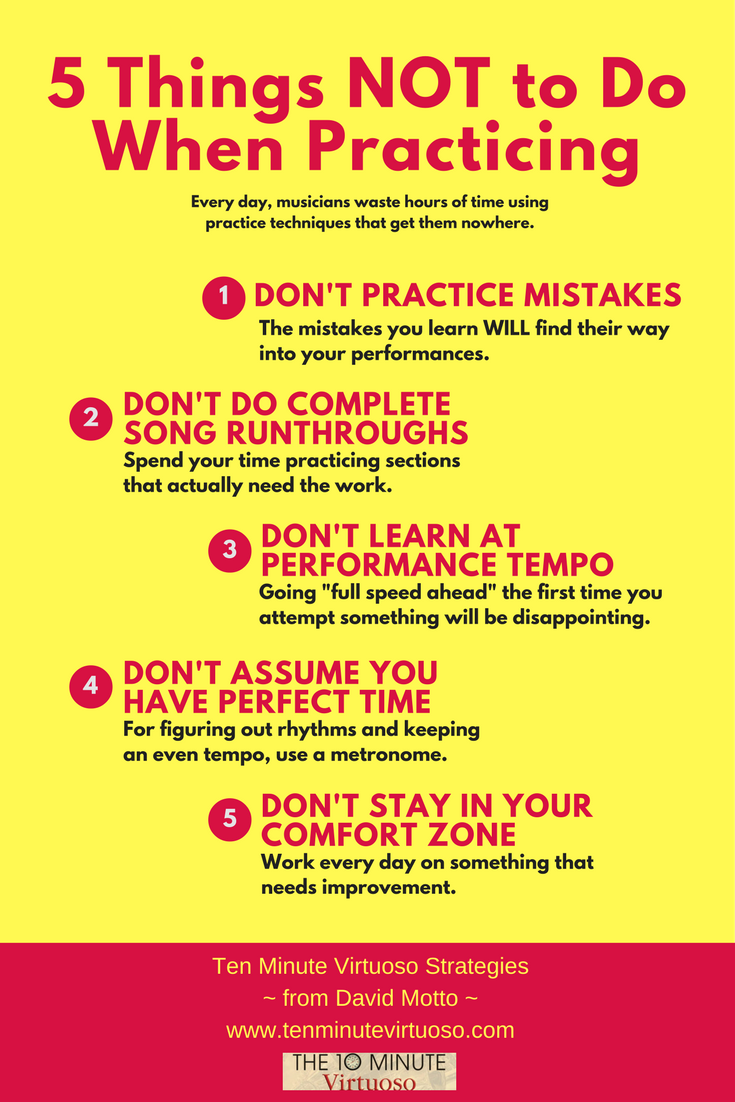David Motto’s Practice Tip of the Week:
Know What NOT to Do
Stop Fumbling Through Your Practice Sessions
This week, I’m changing my normal approach to practice tips. Instead of offering suggestions of what to do to make your practicing efficient and effective, I’m going to tell you what NOT to do. Knowing what NOT to do will save you hours of wasted time, frustration, and wondering why you’re playing isn’t getting any better.
By being aware of unsuccessful practice techniques, you can avoid them. This will lead to more productive practice sessions and greater enjoyment from playing your instrument.
Because many musicians do not receive any guidance on how to practice, they fumble their way through their practice sessions, hoping for a positive outcome. Maybe they think that playing something badly over and over again will somehow lead to a perfect performance!
5 Things NOT to Do When Practicing
1. Don’t Practice Mistakes
The errors you make while practicing CAN and WILL find their way into your performances. You can build muscle memory that is wrong just as well as you can build muscle memory that is right. Be careful!
2. Don’t Do Complete Song Runthroughs
Don’t run through a song from beginning to end every time you play it. Instead, practice the parts that truly need the work. If all you’re doing is running a song from start to finish, the easy parts will continue to be easy, and you’ll never figure out the hard parts. Avoiding runthroughs is absolutely crucial when you’re first learning a song.
3. Don’t Learn at Performance Tempo
Don’t play a song at tempo the first time through. Going “full speed ahead” the first time you attempt something will probably be disappointing and frustrating. By going slowly, you’ll be able to take control of the music more quickly and make sure that you’re building the technique needed to play all parts of the song.
4. Don’t Assume You Have Perfect Time
Working on rhythms and keeping an even tempo is a big part of mastering a song. Generally, you won’t want to trust that your interpretation of even time is completely accurate – especially when working out a challenging rhythm. It’s better to trust a metronome, drum machine, accompaniment software, or other tool designed to beat perfect time and evenly-spaced subdivisions.
5. Don’t Stay in Your Comfort Zone
Don’t spend all of your practice time playing only what’s comfortable and fun. It’s important to work every day on something that needs improvement. While you don’t want to leap too far outside of your comfort zone (which leads only to frustration), you want to always push just beyond your current technical limits.
Avoid Common Errors
Each of the five items on this list is a common error made by musicians. Making these errors will slow your progress and make you less successful. The best thing is you can combine your practice strategies and avoid all of these errors at the same time. Here’s how:
In your song, choose a very short section that you can’t yet play (so it’s just outside your comfort zone). Loop that section at a very slow tempo, playing it without mistakes along with a metronome. Do this every day!
To speed up your road to success, know what NOT to do. Then, focus on what you WILL do.
To Your Musical Success!
–David Motto




